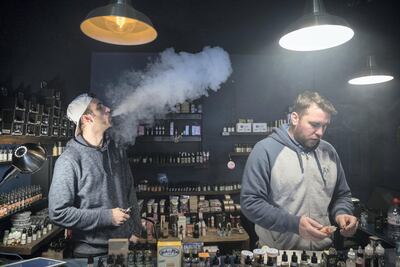It is 1960, and New York advertising executive Don Draper steps into his office lighting up a Lucky Strike, his brand of cigarette.
Gazing across the Manhattan skyline, the suave Draper fills the room with smoke as he coolly exhales, pondering his next big advertising move.
The award-winning Mad Men TV series captured an era when smoking was cool, the tobacco trade was booming and cigarettes were promoted as a healthy living choice.
"People love smoking," a junior told Draper in one episode, as the two discussed their latest ad campaign.
Lucky Strike was often central to the plot of the series. In the real world, sales of the brand soared after the show was first broadcast in 2007, with smoking at the heart of the masculinity of its main characters.
But later in the series, Draper's wife Betty discovered she had lung cancer.
The industry has been forced to change since the peak of Big Tobacco in the Mad Men era. Demonised for selling half-truths and misinformation, "harm reduction" is the now the buzzword of cigarette companies as they try to regain a faltering foothold against fierce competition.
E-cigarettes are the coming force, and while bubble gum flavoured vaping creates moral panic among parents, schools and detractors, industry experts are changing their tune.
Experts at this week’s global conference on the industry in Georgetown, Washington, said they were encouraging smokers to turn to e-cigarettes.
While the long term health problems associated with e-cigarettes and vaping remain largely unknown because the devices are relatively new, the damage caused by conventional smoking is a proven fact supported by decades of medical research.
“If a smoker is unable to give up combustibles, they should switch to e-cigarettes – that is the opinion of the US Food and Drug Administration, Public Health England and the American Heart Association,” said Tom Miller, Attorney General of Iowa.
Mr Miller is known for his long fight to reduce the huge death toll and financial burden of tobacco addiction, particularly on behalf of children and US taxpayers.
He forged an agreement across the US that led to the tobacco industry paying out billions of dollars and changed the way it conducted business.
“It’s just not true that e-cigarettes act as a gateway to regular tobacco, and there is a lot of deception in this area from people trying to prove e-cigarettes are approaching the harm levels of combustibles,” Mr Miller said.
"I know nothing about young people using e-cigarettes that should get in the way of that. They offer a significant aid in cessation."
Other experts said that much of what was being peddled by government regulators was causing harm by encouraging smokers to stick with cigarettes. And smokers should be given the choice.
Japan is leading the international market in adoption of non-combustible alternatives, where regular smoking has fallen by about 32 per cent. That has, in part, been attributed to widespread use of a device from tobacco giant Philip Morris International.
In 2014, Japan was chosen as the market to launch the iQos device, the last great hope of the tobacco industry. The gadget heats tobacco leaves at a very high temperature to offer a similar taste and experience to conventional cigarettes, without the harmful carcinogens.
Although iQos sales were slow at first in Japan, they rose rapidly in 2016 after six popular comedians praised them on TV ... and a craze was born.
One of the comics, Terumoto Goto, a household name in the country, held aloft a red iQos and said: “It doesn’t release smoke. It’s like steam coming out of my mouth.”
Rooftop iQos bars and shops soon appeared around central Tokyo to accommodate the booming market. But despite the popularity of iQos in Japan, regulation and legislation continues to provide barriers against the device.
In March, the Ministry of Health in New Zealand, where e-cigarettes are banned under similar regulation to those in the UAE, charged Philip Morris with selling such products.
A judge agreed with the company's defence that although the tobacco sticks burnt in the devices may have risks, the product is not as harmful as ordinary cigarettes.
The ruling could be a major development in how the devices are accepted as vaping regulation develops.
In October, researchers from the Georgetown Lombardi Comprehensive Cancer Centre in Washington published the first study to model public health results if cigarette smoking were replaced by e-cigarettes.
________________
Read more:
Special report: Medical opinion shifts from tolerating e-cigs to actively promoting them to smokers
Happiness in advertising: Too much of a good thing?
Electronic heated-tobacco products 'just as harmful as conventional cigarettes' study finds
_________________
Investigators led by oncology professor David Levy looked at variables including harm from e-cigarettes, youth uptake and rates of those who quit smoking. They concluded that up to 6.6 million US smokers would live substantially longer if cigarette smoking was replaced by vaping over a decade.
"We've found ourselves at the crossroads at the harm reduction debate from other products," said Mitch Zeller, director of the FDA Centre for Tobacco Products. "All roads lead back to combustible cigarettes as they are designed to maintain an addiction.
"There is a recognition that considerable risk still exists but we now have a vision where cigarettes will no longer create a sustainable addiction and that nicotine will be available from alternative sources."
So although vaping and similar methods of "smoking" do not solve the health burden caused by nicotine addiction, they can temper it, which is promising given their continued popularity and growing visibility in popular culture.
Perhaps in many years, TV shows looking back at our near future will feature a dapper young professional, e-cigarette in hand, nonchalantly puffing a cloud of steam into the sky.
“People hate smoking,” he might say.





